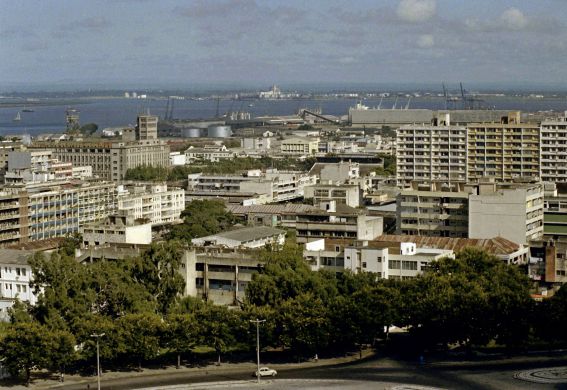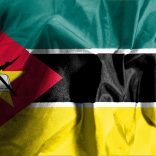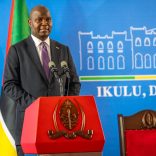Mozambique: Government meets all indicators to be removed from 'grey list'
Trying to placate IMF visitors with arrests, cuts & a sacking – By Joseph Hanlon

The IMF technical mission is scheduled to be in Maputo until Wednesday 13 December, and during its two week visit the government has rushed through a series of actions intended to pay obeisance to the visitors. But the offerings are not enough, because they do not include what the IMF has demanded to restart a programme – more information on the secret debt – and what it also wants – a reorganization of the Ministry of Finance.
The offerings so far include several heads. Carlos do Rosario, “Person A” in the Kroll report, has been dismissed as Director of Economic Intelligence of the security services SISE (Servico de Informacao e Seguranca do Estado), but he apparently retains his post as head of the three SISE-controlled companies linked to the secret debt, Ematum, MAM and ProIndicus. (Canal de Mocambique, 6 Dec).
And three of those accused in the case of the Embraer bribe were arrested Wednesday 6 December, held in prison overnight, charged, and released Thursday on a total bail of $240,000. The $800,000 bribe was paid in 2009 to ensure Mozambique Airlines (LAM) bought two Embraer planes. The three are Jose Viegas, the former chair of LAM who negotiated the bribe; Mateus Zimba, who set up a shell company called Xihevele, registered in Sao Tome and Principe, for the sole purpose of moving the money from Embraer to the recipients of the bribe; and Paulo Zucula who was Transport Minister at the time.
And the Council of Ministers Tuesday 5 December announced three changes. High ranking officials will have their perks cut substantially, saving the government $120 mn next year, according to Economy and Finance Minister Adriano Malaeiane. Cutting the extravagant rent subsidy will save $18 mn; government cars will be smaller and officials will lose the right to buy subsidized personal cars. Fuel and mobile telephone subsidies are reduced; the phone subsidy is cut to $165 per month (more than double the minimum wage just for mobile phones). And the bonus for having academic degrees is cut. (AIM En, O Pais 6 Dec) CanalMoz (6 Dec) notes that the cuts come after a spending spree, with an estimated $12 mn on luxury cars; it points out that in 2010 after the riots caused by price rises government approved a similar austerity package but never implemented it. Africa Confidential (1 Dec) points to the Canadair Challenger 850 private jet bought for President Nyusi for $9.2 mn in October. AC notes that “the registration number C9-MEL gives away the identity of the plane’s main beneficiary, our sources say. Mel means honey in Portuguese, and Nyusi means bee in Makondi”.
The Council of Ministers also approved a decree clarifying “how and why” the state can borrow money and guarantee debts, domestically and internationally. Maleiane said it did not contain any new legislation, but instead brought together diverse laws and regulations. It also makes clear how public servants and state agents can already be held liable for violations of the law. (Zitamar 6 Dec) So far, the decree has not been published.
Ministers also approved a plan to speed up VAT rebates. But this will be hard to enforce, because overdue rebates have become an important pool of money from which to pay government salaries.
An IMF target continues to be mismanagement of state-owned companies, so last week it was confirmed by Deputy Transport and Communications Minister Manuela Rebelo that the mobile telephone company MCel (Mocambique Celular) and the land line company TDM (Telecomunicacoes de Mocambique) will merge next year. (O Pais 7 Dec). Both had been well run and MCel was the first mobile company, but management has deteriorated and both are making losses.
On 27 November President Filipe Nyusi went to the Cahora Bassa dam and announced that 7.5% of the dam company Hidroelectrica de Cahora Bassa (HCB) would be floated on the Mozambique stock exchange, to raise money for equipment rehabilitation. HCB appears to be 92.5% owned by Electricidade de Mocambique (EDM) and 7.5% by the Portuguese electricity grid Redes Energeticas Nacionais (REN), which in turn is 25% owned by the China state electricity grid. It is not clear if these will be new shares, or part of the EDM holding. Zitamar (7 Dec) estimates the value of HCB at $700 mn, so the share sale could raise $50 mn. O Pais (4 Dec) praised HCB as “a rare example of good state management”, showing public enterprises can be run differently.
Import duties were increased on products consumed by poor and middle class people when parliament on 21 November removed a series of exemptions on products including second hand clothing (which will be charged $.40 per kg) and older used cars. The exemption also technically applies to carapau (Atlantic horse mackerel), the cheapest frozen fish, but 94% of carapau is imported from Angola, South Africa and Namibia and no import duties are charged on SADC products. (Diario de Mocambique, 24 Nov) So the change seems largely for show.
These interventions are, in part, a response to a 16 November speech by IMF resident representative Ari Aisen, where he called for “additional fiscal adjustment [which] should prioritize the reduction of current expenditure while trying to protect social sector spending. On the revenue side, it should seek to limit VAT tax exemptions.” There is also a need to “strengthen the management of public finances, including debt management, payments in arrears, and the difficult financial situation of some public companies.”
Other economic crisis news
A loss of only 35% on the private debt would be seen as a good deal for creditors, and would be good enough for Moody’s rating agency to improve Mozambique’s sovereign debt rating. (Lusa 4 Dec) The Ematum bonds, which have state backing, have been trading at roughly that discount, which means bondholders hope for better. But it seems likely that the syndicated loan holders, still dependent on the illegal state guarantee, would need to accept a much poorer deal.
Teachers are striking at three secondary schools in Chimoio, refusing to correct exam papers until they are paid their overtime for the past four months. Budget cuts mean the government is not hiring enough teachers so many teach extra classes, and in Manica they are owed overtime payments from 2016. (O Pais 8 Dec)
The World Bank continues to grant new loans to government, despite the donor ban on money to government until more information is released on the secret debt. The latest loan is $80 mn for natural disaster management. (O Pais 6 Dec) In September the World Bank agreed a $150 mn loan to Electricidade de Mocambique (EDM) of which $117 mn is to pay for rehabilitation and maintenance not done over the past few years when president Armando Guebuza kept electricity prices artificially low, meaning EDM did not have money; $30 mn is cash “to support EDM’s operational and commercial operations”.
An ambitious plan for Maputo’s historic baixa was launched at a tourism forum 4 December. It would involve stopping the 300 early 20th century buildings from decaying, creating 7000 new parking places, encouraging more people to live in the downtown area, and pedestrianizing Av Samora Machel to create a Ramblas as in Barcelona. (@Verdade 7 Dec) But the cost would be $200 mn, small compared to the $2 bn secret debt (and a much more sensible use of that money) but Maputo cannot borrow that now. Perhaps the World Bank?
Good rains for northern farmers but water shortages for Maputo
Rain in October and November north of the Zambezi River was above average and this will continue through February, according to the Meteorological Institute (Instituto Nacional de Meteorologia, INAM), in its latest rainfall forecast. This bodes well for farmers in the richest northern provinces. However, south of the Zambezi River, rainfall has been somewhat below average, and this too will continue for the rest of the rainy season. http://www.inam.gov.mz/images/pdfs/Monitoria-e–Actualizacao-de-DJF-2017_18.pdf
Rainfall has been particularly weak in Maputo province, and the previous two years of drought left the Pequenos Libombos dam which supplies Maputo nearly empty, forcing water restrictions in Maputo. The lake behind the dam is only 21% full, which suggests it will not fill completely this year, which means restrictions will be extended.
The Ministry of Public Works, Housing and Water Resources publishes a detailed daily hydrological bulletin, with river flows and lake levels compared to previous years and the level at which a flood is declared. The Ministry does not post them, so I am putting them on my website each day: http://bit.ly/flood-17 The daily reports become important when flooding starts.
INAM has an excellent rainfall atlas on http://www.inam.gov.mz/images/Climatologia/ATLAS-INAM-FINAL-Por-Ser-Printada.pdf
New raid in Cabo Delgado
Two people were killed in an attack on two villages in Palma district, Cabo Delgado, on 29 November. Houses and a Christian church were burned. (CanalMoz 6 Dec)
This follows an attack on the town of Mocimboa da Praia on 5 October. The district government said on 3 December that 308 people had been arrested after the October raid, of whom 100 were released and 208 charged – 175 Mozambicans and 43 foreigners (including Tanzanians and Somalis), 152 men and 56 women. Local police said that before the attack, the insurgents sold their belongings and their houses, and abandoned their mosque, a simple structure made of local materials. (Zitamar 4 Dec, 20, 22 Nov) The Mocimboa da Praia district government said the fundamentalists had studied religion in Tanzania, Sudan and Saudi Arabia and had also received military training. (AIM En 4 Dec) Zitamar (22 Nov) reports that in 2016 militants gained permission and built a mosque in Congolo, Macomia, Cabo Delgado, but that the mosque was torn down by local people after it became clear that the mosque was telling its followers to defy the authorities and not to participate in state education. Government has closed three mosques in Pemba, and provincial authorities say others will be closed.
Customs official attacked
The head of the Maputo International Maritime Terminal (TIMAR, Terminal Internacional Marítimo de Mercadorias de Maputo) was attacked and seriously injured outside his home on 30 November, the chair of the Mozambique Tax Authority (AT), Amelia Nakhare, told customs staff in Maputo port 4 December. She noted that TIMAR accounts for 40% of all Mozambican customs revenue, but that it is not on target – its target for the year is to collect $567 mn, but after 11 months it has only collected $ 411 mn. (MediaFax, AIM En 5 Dec)
In part this seems to be due to inefficiencies in TIMAR. Of more than 1,000 manifestos from cargo ships that had entered the port since January, only 220 had been closed, Nakhare said. And at the “Single Electronic Window” (JUE), the computerized system that was supposed to make customs procedures very simple, 20,000 cases are still pending, some since 2012.
Much of the revenue at TIMAR comes from the import of second hand cars from Japan, which for some years has been part of a very organized corruption system. Car dealers pay bribes to customs officials to declare that the car is in bad condition and of little value, and thus pays a low customs duty. Last year a TIMAR official was arrested and charged with corruption.
Land for trees instead of food
The struggle between the Portuguese paper company Portucel and local peasants continues after more than five years. Controversially, Portucel was given 183,000 ha in Manica – much of it good farmland – to plant trees to make pulp for brown paper bags for Europe. A group of 100 families in Gondola district says they are being pushed off their land by Portucel. Portucel reports it has planted 13,200 hectares of eucalyptus, about 4% of the 356,000 hectares it has been given in Zambezia and Manica, and says it is investing $135 mn. (O Pais, 6 Dec)
By Joseph Hanlon













Leave a Reply
Be the First to Comment!
You must be logged in to post a comment.
You must be logged in to post a comment.